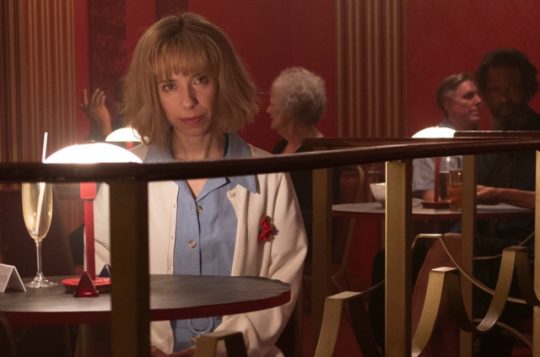Brit-indie film Eternal Beauty is the latest quirky character-driven piece to showcase Sally Hawkins on top form. After being jilted at the alter in her younger years, protagonist Jane’s mental health has deteriorated, providing Hawkins with plenty to dive into. We join her in middle age and explore the intense difficulties and isolation of her day-to-day life, tottering from family dinners to hospital appointments to hallucination-filled nights home alone. And it’s a comedy.
Hawkins looks so fragile she could break and perfectly portrays the childlike, detached Jane – a character we will all recognise in someone we’ve come across in our lives. She’s an outcast, unique and heartbreakingly damaged. The lead actress is also bolstered by a fantastic supporting cast including David Thewlis, Billie Piper, and Penelope Wilton—fantastic as helpless mother Vivian who clearly also suffers from her own problems with mental health.
The film’s recurring red telephone repeatedly pulls us back to the opening wedding-disaster sequence and effectively creates an ever-present dread and eeriness. Ominous shots of dark skies and pill-bottle closeups scatter the film, too, reinforcing the idea that although Hawkins’s performance might feel whimsical at certain points, something sinister lies beneath the film’s veneer at all times. Other elements of cinematography and editing are crucial too: queasy sweeping shots of Jane’s apartment, symbolic deployment of primary colours, off-kilter focal arrangements, and abrupt cuts. They combine to create a vivid and unsettling impression of paranoid schizophrenia. The accompanying eerie Hitchcockian score amplifies the discomfort too. Production design also cleverly contains Jane in the 1960s – the period of her youth when her problems first began. The sets and costume all belong to this era, even though the film is predominantly set in what must be the 80s or 90s.
Writer-director Craig Roberts skilfully manages to steer Eternal Beauty away from what could have been a morose, torturous exploration of mental health. Yes, it is grim at times and several scenes are very uncomfortable to watch. However, it is playful too. By the finale, we feel there’s something oddly admirable about Jane. She’s witty, stubborn, and playful and Hawkins creates a multi-faceted character who is deserving of much more than just pity. Following awards-laden turns in Blue Jasmine, Maudie, and The Shape of Water, expect more praise and nominations for the star this year.
